- Home
- Neal Stephenson
The Rise and Fall of D.O.D.O.: A Novel Page 40
The Rise and Fall of D.O.D.O.: A Novel Read online
Page 40
2. Even if it works for a DOer to show up in Constantinople from parts unknown, with no connections or background, he’s not going to be able to pass for a Varangian Guard unless he speaks the language. Leading to the question: What is the language that these guys speak, and where can we learn it? Stokes?
Reply from Dr. Melisande Stokes, Day 630:
Tristan, the Varangian Guards were drawn from all over Scandinavia, Northern Europe, and Britain over a span of centuries, so it depends. In our era (1203) the majority were speaking Anglo-Saxon. But some of the ones Chira encountered were apparently speaking Norman, which is a transitional dialect, not a stable language as we normally think of it. As you probably know, the Vikings invaded France, were bought off with Normandy, settled there, then used it as a base for invading Britain and many other places. The most bad-ass Normans crossed the Channel with William the Conqueror; the ones that stayed behind in Normandy spawned the generations who mostly enjoyed jousting and courtly love, etc. . . . This + Normans and Anglo-Saxons obviously detesting each other = surprising to find Normans in the 1203 Anglo-Saxon-centric Varangian Guards. But actually, we can use it to our advantage:
If we train DOers to speak Anglo-Saxon, they will probably blend in just fine no matter their accent, but they do run some risk of being called out—Anglo-Saxon had a limited geographical spread and thus a limited number of dialects, most of which are probably represented in the 1203 VG cohort. Someone speaking an eccentric variation might arouse curiosity. Small chance, but a chance.
However: Variations of “Norman” were spoken from Greenland to the Volga and from Sicily to the Arctic Circle. If Normans were accepted into the VG, then a DOer could learn any kind of mash-up passing as some variant of Norman, and never run the risk of being called out for lack of fluency—they can just claim they’re from some other clan over the mountain. There would be too many variations of the language, and too few native speakers in residence, for anyone to get wise.
From Dr. Roger Blevins, Day 631:
I have been monitoring this exchange with some interest. LTC Lyons’s idea seems to merit further development.
LTC Lyons: please see me about deploying Chira Yasin on scouting missions to Constantinople so that we can better understand procedures for recruiting Varangian Guards. I only wish that she were less conspicuous. Can we put her in a burka? There must have been some Muslim presence in the city in that era.
Dr. Stokes: the obvious failure mode in your linguistic analysis—for Norman or Anglo-Saxon—is that our DOer, claiming to be a native of some specific region, might happen to cross paths with another Varangian Guard who actually was from the exact same location, and who would detect faults in our DOer’s accent, knowledge base, etc. and become suspicious. Agreed: less likely with Norman than with A/S, but not impossible. We can minimize the chances of that happening by developing a cover story according to which our DOer is from an exceptionally remote and obscure part of the Norman world. Please move this to the top of your priority list.
DODO REPORT
POTENTIAL KCWs, NORMANDY, 12th Century
BY MELISANDE STOKES, PH.D.
Submitted to ODIN archive, Day 645
OBJECTIVE: Identify potential Known Compliant Witches (KCWs) in remote settlements in Normandy during the approximate span 1050–1200, as a preliminary step toward establishing a DTAP there/then. Proposed function of that DTAP: to serve as “Language Camp” for Fighter-class DOers, giving them linguistic and cultural proficiency needed to pass as (Norman) Varangian Guards in the 1200 Constantinople DTAP.
GENERAL BACKGROUND: Normandy in this era had been colonized by transplants from both Scandinavia and Anglo-Saxon-Danish-influenced regions of Britain for well over a century. It had not yet been incorporated into France but had been expanding its borders at France’s expense for some time. The linguistic environment was accordingly complicated and fluid. The population was largely Christianized, at least in name (nobility very much so by 1200). Since most were illiterate, essentially all of the available records fall into three categories. The first two are (1) legal records and (2) chronicles/accountings kept by the feudal lords’ stewards, but these rarely refer to women independently of their marital status. The more fruitful source therefore is (3) church documents, typically written by priests, friars, etc. in Latin or, less frequently, medieval French.
METHODOLOGY: Review medieval church documents for points of convergence per following criteria: (A) references to heretical leanings per church fathers; (B) family trees featuring illegitimate but non-ostracized daughters over the course of several generations; (C) recorded activity suggestive of magic, particularly pertaining to crops, livestock, weather, and ease of pillaging nearby adversaries; and (D) perceived non-conformity in local female individuals, especially those as found in (B) above.
RESULT: POTENTIAL KCW THYRA OF COLLINET
A: “And in June of this year (1027) was Thyra delivered of a girl-child of no known sire, as Thyra herself had been twenty-two summers earlier, and her mother Wilmetta before her, and yet was Emma the aunt of Thyra joyful to receive Thyra and her bastard child to her hearth, and the child was christened Beatrice.” (ref 2876)
B: “And in April of this year (1046) was Thyra again deprived of those villainous and Satanic objects with which she adorns her cousin’s chamber, and scorned to replace them with an image of Our Lord. For this she was given a penance of ten Hail Marys which she was loath to perform, but said she would rather receive a lash, at which the priest hastily did declare her free of all sin.” (ref 3486)
C: “And in this month (August 1050) did Thyra of Herb-lore cause great sorrow upon the (mayor?) of the village of Collinet and the (lord?) of (? Illegible) for her scolding at their crossing her when she wished to forage upon their lands for select herbs.”
D: “And in this month (January 1061) died Thyra of Herb-lore, and the valley wept at her passing for fear of the famine returning that they credited her for keeping at bay.” (ref 6584)
Further research recommended, as incidental accounts in 1002, and throughout the 1100s, suggest an uninterrupted lineage of witches in Thyra’s family, all with strong local and familial authority. (Rec search words: 1137 Collinet:Maneld, 1191, 1192, and 1195 Collinet:Rikilde, and 1193 and 1197 Collinet:Imblen)
Exchange of posts between
Dr. Roger Blevins and Dr. Melisande Stokes
on private ODIN channel
DAY 650 (MID-MAY, YEAR 2)
Post from Dr. Blevins:
Dr. Stokes, I am hereby directing you to proceed with the recruitment of the potential KCW known as Thyra, circa 1045.
As much as we need your energies behind the expansion of the Diachronic Operative Resource Center, it is clear that you are the best qualified of our existing roster of DOers to undertake this mission, and so I suggest that you delegate some of your present responsibilities to others as you undertake the necessary training. Macy Stoll is an obvious candidate to shoulder routine administrative and managerial tasks and has expressed a willingness to do so.
Reply from Dr. Stokes:
Understood. As busy as I am here, I can’t dispute that I would be the best person to act as Forerunner in this DTAP, barring some recruiting breakthrough in the next couple of weeks.
I anticipate that getting up to speed on local languages and customs will occupy me for most of the summer, with the actual DEDE slated for August. Meanwhile Erszebet can be putting in the usual research needed to Send me to that DTAP with reasonable temporal and positional accuracy.
One thing about your message surprised me, and so I wanted to double check to make sure there was no misunderstanding. You specified Thyra, 1045, as the target of the operation. This means that our DOers would be learning a dialect of Norman, and a set of customs, that would be 150 years out of date by the time they show up in Constantinople circa 1200.
My research indicates that Thyra’s descendant Imblen is also a witch. I propose we have a higher chance of success in t
his endeavor if we send our “Varangian Guards” to 1190s Collinet to study with Imblen. They will stand a better chance of both comprehending and being comprehended if they’ve got 1200 Norman French.
From Dr. Blevins:
Thanks for your illuminating feedback. For classified reasons, 1045 works better for us than the 1190s do. Assuming language immersion will indeed work for Tristan, let’s send him back there ASAP.
From Dr. Stokes:
What are “classified reasons”? How could they be so classified that neither Tristan (the probable DOer in question) nor myself (the linguistic historian expressly in charge of determining these matters) is being told about them?
Can we CC in General Frink and Dr. Oda to this thread in case they can shed light on either Chronotropic or top-level-strategic reasons for not doing the sensible thing here?
From Dr. Blevins:
Mel, thank you as always for your spirited commentary. There is no need to trouble either General Frink or Dr. Oda in this case. The answer is straightforward: training our “Varangian Guard” candidates close to the time of the Constantinople DTAP is dangerous because, however remote their “hometown,” they could still be recognized. That is why to choose a spot not only temporally but also geographically isolated from 1200 Constantinople.
Other issues in this decision are above your pay grade so you don’t need to know.
DODO MEMORANDUM
CLARIFICATION TO DRESS CODE
BY MACY STOLL, MBA
POSTED Day 653
The distribution of DODO’s newly minted dress code has brought in a flood of requests for clarification. Until such time as this document can be reworded, here is a useful rule of thumb: DOers on active missions are exempt from all dress code provisions, including the requirement to wear anything at all.
LETTER FROM
GRÁINNE to GRACE O’MALLEY
Winter Solstice, 1601
Auspiciousness and prosperity to you, milady!
I pray Your Grace will forgive my few months of silence, for wasn’t it in a terrible way I found myself, trying to secure safety and security after the disaster of the lomadh. Rose it was sent Tristan Lyons back to his era, and wasn’t I glad to see the back of him for a while.
But only for a while, Your Majesty. For I’ve landed on my feet, and determined I am to learn the truth behind what Tristan be up to. When he “told me everything,” truly ’twasn’t everything at all, or else why would that right arse Les Holgate appear and make such a muck of everything? There are things going on in the future, and it’s to do with magic, and ’tis the least Tristan Lyons can do but be fully honest with me at last, now that he and his like have robbed me of all I cherish in London.
But as I said, it’s safety I’ve found for myself, and at the merest cost. I’ve told Your Majesty in years past of Francis Bacon’s society of Good Pens (’tis a pun on the male member, is what I’m thinking, given what I know of Sir Francis). This group meets at Gray’s Inn, and composed of the brightest of menfolk it is, them being intelligencers and counterfeiters, not to mention secretaries, physicians, poets, theologians, apothecaries, and the occasional natural philosopher, and of these last few, doesn’t Sir Francis love to debate with the nature of the universe, in ways that seem like conversations witches might have with each other, if witches were wont to waste their time putting into words things which go without saying. There are no witches in their discourses and indeed no women at all! Like a bunch of turtles trying to discuss flight, they remind me of, and not getting all of it correct, neither.
But sure it’s entertainment enough. Don’t I keep my mouth shut when I’m near them and pour the ale; they are the best minds in London, and one of them natural philosophers with a mystical bent, one Jacques Cardigan (a mad enough fellow with a mad enough name!) has taken me in as a servant, and Your Ladyship will understand that I warm his bed when he asks for me, but it’s an easier life than posing as a bawd, so it is. Himself is a wealthy enough fella, although an obvious Catholic (what with a French name and his surname coming from a Catholic shire in Wales, he can hardly hide it, can he?), so he keeps out of politics and that may in the end mean I must move on to other quarters, for to be of use to Your Grace. But for now it’s safety and security and no questions asked—sure he thinks he’s landed in it, here’s a pretty Irish refugee who will give him pleasure in exchange for room and board, and not be questioning his religion neither!
He’s a summer house in Surrey, in Norwich, and we’ll be retiring there come spring, if I’m still under his roof then, but through winter we’re near enough to Gray’s Inn. Rose knows my circumstances and conveyed them to Tristan, so I’ve let him know I’m pleased to continue to help him knot his net-work of witches, and it seems to have grown with breathtaking speed, so it has. I’ve stopped asking him questions directly, though, and it’s trying to learn a bit by observation I am now. For it seems to me that he knows precisely what it is that brought magic to its knees, and it seems to me that if I might know it too, I might hoist him by his own petard (to quote that poxy playwright)—I could be using his own strategy of moving around through time and space, not to bring back magic but to prevent its cessation in the first place. I’ve no idea how to make that so, and it’s cagey enough he’s being with his information, but I’ve naught else to do with my time now that I’m away from Whitehall circles, so I mean to figure it out.
The one thing I’m knowing for certain is that in his ever-expanding fellowship of witches, Tristan occasionally runs into an ornery one who needs to be coaxed into the congregation (and sure why shouldn’t they? I would have been demanding some coaxing, if I didn’t foolishly think I could benefit from him as much as him from me.). At this moment of time, himself and some other DOers are romping about the universe trying to please some Wending woman in Antwerp who lived some fifty years back (and who had some connection to that banker fellow, Gresham—and therefore somehow-or-other to my new friend Bacon, for didn’t Sir Thomas Gresham’s bastard daughter marry Sir Francis’s half-brother? Is right she did. And of course I’m sure the Fuggers are involved in all of this somehow, they always are.).
Truth be told, I don’t even know if I should be taking the side of Tristan. What does he need do in Antwerp fifty years back? Especially requiring magic? Was there something about that time and place that contributed to the corruption of magic? And why make use of a witch who knew the forebears of the menfolk I now brush elbows with? A pure coincidence is it, or with his future-knowledge does Tristan plan to make use of me somehow, and my new friends? So many questions, Your Grace!
So it’s learning about all that I intend to do, but not so’s Tristan would notice my efforts. In fact, I intend to make myself excessively useful to him, in the hopes that he includes me in his confidences. (Perhaps even finds cause to have me Sent to his own time! Then I can see for myself what’s what.) He’s a grand lad, when he’s not scheming on behalf of his overlords, and I’ve a fondness for him, so I do.
With all good wishes to ye, milady, Gráinne formerly of London
DODO HUMAN RESOURCES
PERSONNEL DOSSIER
FAMILY NAME: Overkleeft
GIVEN NAME(S): Esme Claire
TITLE: Doctor (Ph.D., Bioinformatics)
AGE: 34
CLASS: Closer/MacGyver
HEIGHT: 5′10″
EYES: Blue
HAIR: Chestnut
COMPLEXION: Light, freckled
DISTINCTIVE FEATURES: Crooked nose, bent left clavicle (results of sports injuries)
ETHNICITY: Northern European
NATIONALITY: Belgian
LANGUAGE FLUENCY RATINGS:
Dutch, French: 5
English, Walloon: 4
German: 3
RELIGION: Atheist, from historically Catholic family on mother’s side, historically Dutch Reformed Church on father’s
CITIZENSHIP: Belgian (EU)
BIOGRAPHY: From an academic family that moved among various universit
y towns (mostly Low Countries) while she was growing up. States that this nomadic lifestyle forced her to acquire social skills she might otherwise have neglected given a generally introverted/intellectual personality. Participated in various sports, with emphasis in field hockey and track & field. Hobby: sewing and textiles. Attended University of Antwerp, majored in biology. While at school, became involved in local chapter of Society for Creative Anachronism with emphasis on making period-correct clothing. Later obtained Ph.D. in bioinformatics, focusing on plant biology, from Leiden. Obtained security clearance, and thereby found her way into Defense Dept. personnel databases, as result of a NATO project to design upgraded military camouflage patterns in response to projected botanical shifts resulting from climate change. When approached by DODO, was in London seeking investors in an apparel start-up that was a spinout of the camouflage project. Agreed to put that project on ice in order to accept the DODO job.
SKILL SET: Athletic, hardy, uncomplaining, with a winning personality and ability to adapt to various social milieus. Keen eye for clothing, textiles, needlework of the late medieval/early Renaissance era. Exceptionally strong knowledge of botanical matters, especially in Northern/Western Europe.
LIMITATIONS: Her unusual height will make her conspicuous, particularly in medieval populations.
AFTER ACTION REPORT
DEBRIEFER: Dr. Melisande Stokes
DOER: Dr. Esme Overkleeft (Closer)
THEATER: NEER (Northern Europe Early Renaissance)

 Zodiac: The Eco-Thriller
Zodiac: The Eco-Thriller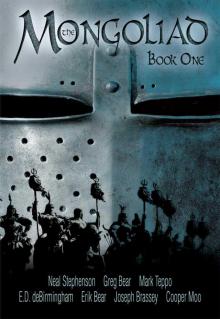 The Mongoliad: Book One
The Mongoliad: Book One Snow Crash
Snow Crash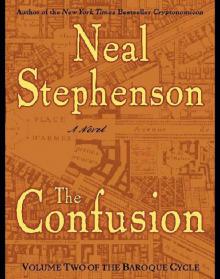 The Confusion: Volume Two of the Baroque Cycle
The Confusion: Volume Two of the Baroque Cycle The Rise and Fall of D.O.D.O.
The Rise and Fall of D.O.D.O. The Diamond Age: Or, a Young Lady's Illustrated Primer
The Diamond Age: Or, a Young Lady's Illustrated Primer The Big U
The Big U The System of the World: Volume Three of the Baroque Cycle
The System of the World: Volume Three of the Baroque Cycle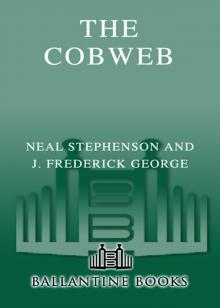 The Cobweb
The Cobweb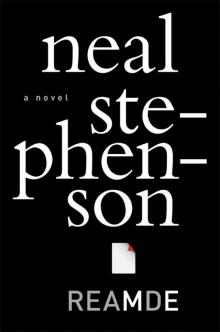 Reamde
Reamde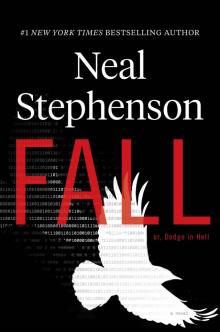 Fall; or, Dodge in Hell
Fall; or, Dodge in Hell Interface
Interface Quicksilver
Quicksilver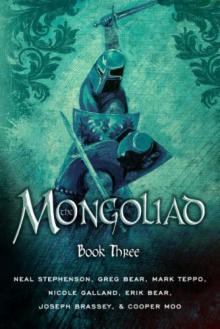 The Mongoliad: Book Three
The Mongoliad: Book Three Seveneves
Seveneves Atmosphæra Incognita
Atmosphæra Incognita In the Beginning...Was the Command Line
In the Beginning...Was the Command Line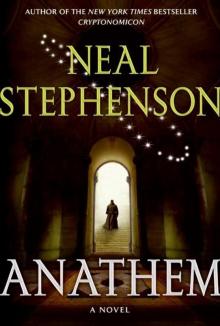 Anathem
Anathem The Rise and Fall of D.O.D.O.: A Novel
The Rise and Fall of D.O.D.O.: A Novel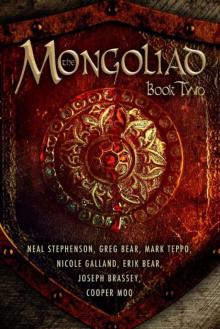 The Mongoliad: Book Two
The Mongoliad: Book Two Diamond Age or a Young Lady's Illustrated Primer
Diamond Age or a Young Lady's Illustrated Primer THE System OF THE WORLD
THE System OF THE WORLD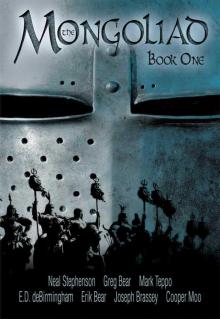 The Mongoliad: Book One tfs-1
The Mongoliad: Book One tfs-1 Some Remarks: Essays and Other Writing
Some Remarks: Essays and Other Writing Zodiac
Zodiac Spew
Spew The Baroque Cycle: Quicksilver, the Confusion, and the System of the World
The Baroque Cycle: Quicksilver, the Confusion, and the System of the World The Diamond Age
The Diamond Age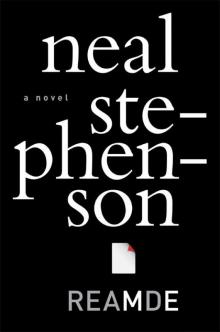 Reamde: A Novel
Reamde: A Novel In the Kingdom of Mao Bell
In the Kingdom of Mao Bell Mother Earth Mother Board
Mother Earth Mother Board Twelve Tomorrows - Visionary stories of the near future inspired by today's technologies
Twelve Tomorrows - Visionary stories of the near future inspired by today's technologies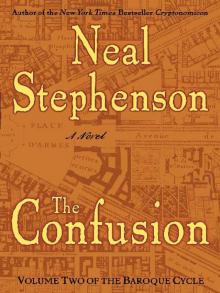 The Confusion
The Confusion The Great Simoleon Caper
The Great Simoleon Caper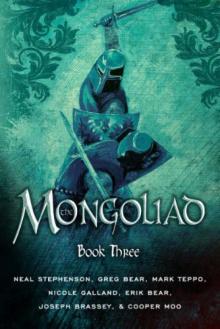 The Mongoliad: Book Three tfs-3
The Mongoliad: Book Three tfs-3